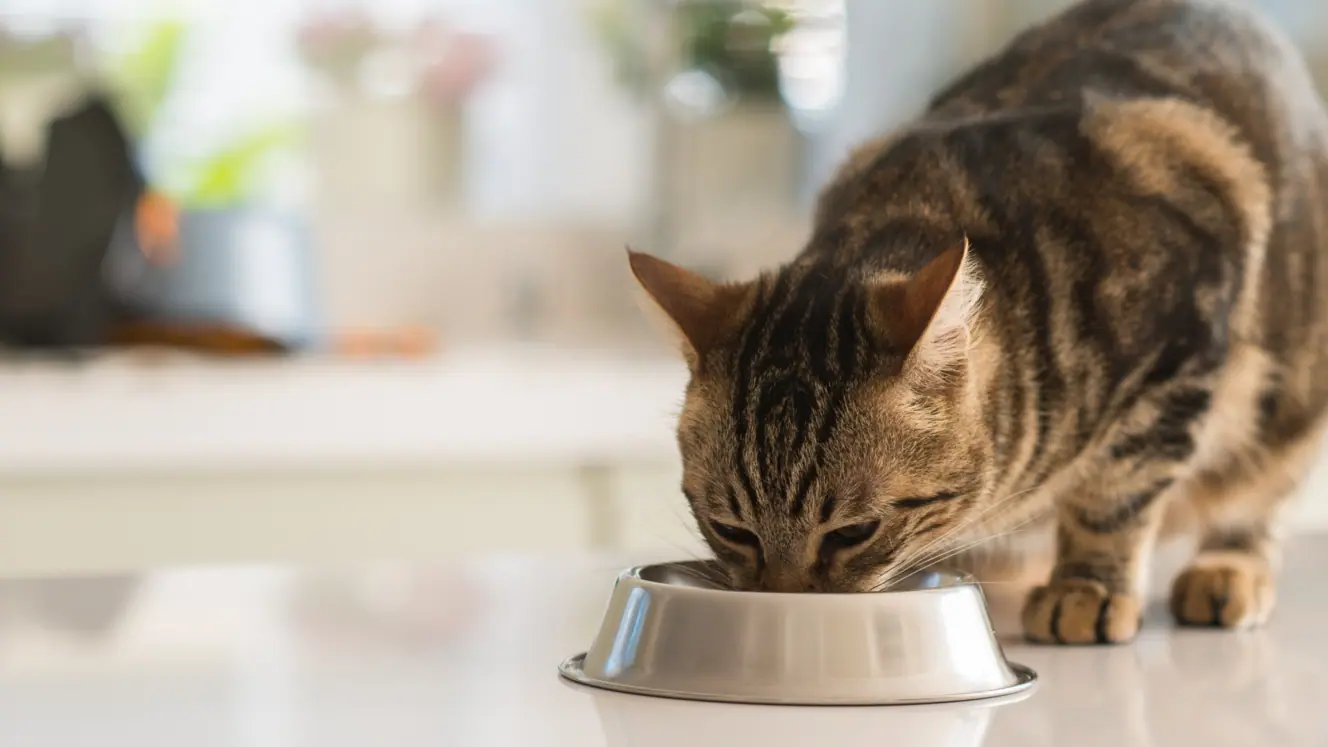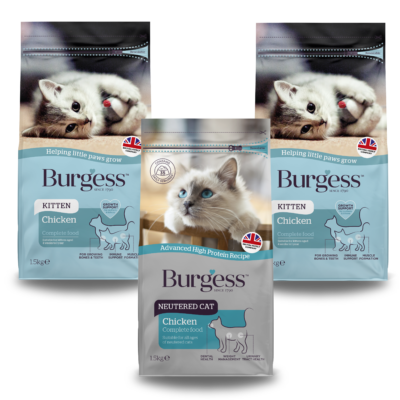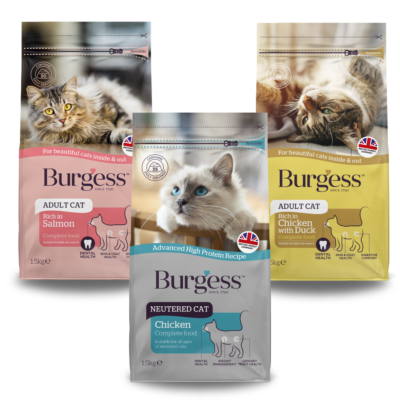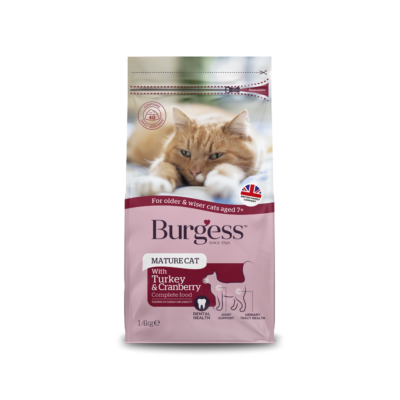
“Some cats (like some people) can be rather particular about what's in their food bowl,” says cat vet, Dr Jo Lewis, winner of ‘Feline Vet of the Year’ and founder of the UK’s first mobile clinic dedicated entirely to cats.
Salmon? Duck? Chicken? Let your adult cat pick their favourite flavour with our fussy cat bundle >>
“Domestic cats tend to have specific preferences for certain textures or flavours of foods and how it is served. We know that a cat's perception of food flavour is not merely down to taste alone – other sensations influence the messages that are sent to the brain when deciding whether to eat or not. This is often interpreted as ‘fussiness’ when the cat is simply being cautious and selective about what it chooses to eat just as we are.”
TOP TIP!
A cat’s digestive system is suited to eating small meals frequently. Dry food provided in feeding balls or scattered around the house provides cats with the opportunity to spend more of their day seeking out their meal.
Source: Cats Protection
Help your kitten grow into their paws with our delicious, nutritious Kitten Bundle >>
Dr Lewis says that as creatures of habit, cats like familiarity and routine. It’s also important to provide the right feeding location and feeding utensils. Her top tips include:
- Privacy and security – Instinctively we and cats are not designed to eat when anxious. It's part of our natural ‘fight or flight’ response. Cats are more likely to eat when they feel relaxed so generally prefer to be left in peace to eat and don't enjoy an audience from humans, other cats/pets. Create a bit of privacy at mealtimes and switch feeding time until after the rest of household has eaten, keeping your cat away from the family eating area during meals.
- Access – If your cat is elderly, arthritic or weak, don't place the food bowl too far away from their preferred sleeping place. If you usually put the bowl out of your dog's reach, for example, consider whether an ageing/unwell cat can easily get to it.
- Timing – Some cats prefer to eat when left alone overnight, others seem to respond well to food if you actually waft the food under their nose while they are sleep.
- Novelty –Although most cats are fans of routine (some even showing a preference to one side of the bowl) some seem to respond to a change of scene. If my cats are being pickier with their food, I offer them the same food somewhere else, and it often makes them more interested.
TOP TIP!
Eating and drinking are quite vulnerable activities for a cat. Placing bowls slightly away from the wall to allow the cat to sit with their back to the wall and view the surroundings will allow the cat to feel more at ease.
Source: Cats Protection
Food bowl etiquette
- Shape – Most cat food bowls are designed to appeal to owners and not cats. Avoid small, deep bowls, instead try offering food in wide, shallow bowls. This avoids a cat's super-sensitive whiskers making contact with anything while eating.
- Height – Consider raising your cat's food bowl slightly with a book/upturned saucer as it may make eating easier for some cats with arthritis/back pain.
- Cleanliness – Make sure your cat's bowl is clean. Many cats won't eat out of a bowl that has bits of old food in it. Would you? Get into the habit of washing out food and water bowls after each use as leftovers from a previous meal are hardly appetizing. Some cats do not like the odour of perfumed detergents/dishwasher residue so unless there is an infectious disease risk try to use hot water soaking/washing alone for cleaning.
TOP TIP!
Cats like to eat and drink away from their litter tray, as it’s more hygienic. They prefer their food and water bowls to be separated too, so it is important to try to spread these resources out around the home.
Source: Cats Protection
Is your cat being fussy – or is it something else?
If your cat is usually a good eater but has suddenly gone off their food, it’s important to get them checked out by your vet as well as trying to determine if something else is causing the issue.
TOP TIP!
Cats often prefer to drink from a moving water source – maybe leave a tap dripping or try a water fountain. Water should always be available indoors, even if your cat seems not to drink it, in case a preferred outdoor drinking source suddenly becomes inaccessible. Cats generally prefer ceramic water bowls as plastic bowls may taint the taste of the water.
Source: Cats Protection
Dr Lewis advises: “You generally tend to know from the word go whether you genuinely have a feline with a choosy palate. If your cat has previously been easy to please but starts becoming choosy then there is usually a reason lurking behind it. It doesn't always have to be a medical illness but stress (often the dynamics between cats in a household) can be equally important.”
TOP TIP!
As cats age, they can become increasingly picky eaters, and many may have a reduced appetite. Some of these changes may arise as a result of an underlying disease, and regular vet visits are advisable for older cats. Senior cats should be seen by the vet at least every six months and more frequent visits may be recommended on veterinary advice.
Source: Cats Protection
EVERY CAT DESERVES A DELICIOUS, NUTRITIOUS DINNER. At Burgess, all our cat food is made using premium ingredients and is high in protein, to ensure excellent quality and superior taste to help keep your cat happy and healthy – from kitten, to adult and mature and our award-winning variety for neutered cats.
Our cat diet and nutrition guide is here to help you create a meal plan that's tailored especially for your feline friend, and their needs.
Is your cat a Burgess cat? Join the Burgess Pet Club for exclusive offers and rewards.
If you found this interesting, you may also like:
CARING FOR KITTENS Discover how you can help your kitten get the very best start in life.
GRASS-EATING CATS? NOT AS STRANGE AS IT SOUNDS As hunting animals, cats have evolved to become dependent on a strictly meat-only diet and don’t have the special enzymes or metabolic pathways to digest and convert nutrients in plants to what they need. Despite this, why do some felines feel the need to eat grass?
HOW TO HELP YOUR CAT SLIM DOWN Does your cat need some help to lose weight? If so, they’re not alone. According to feline charity International Cat Care, it’s estimated that between 39% and 52% of cats in the UK are overweight or obese – but help is at hand.
CATS AND THE BENEFITS OF NEUTERING – WHAT YOU NEED TO KNOW Neutering is a simple operation that will not only stop unwanted pregnancies, but also benefit your cat’s overall health and wellbeing. Feline welfare charities such as Cats Protection and International Cat Care state that getting your cat neutered before they can breed is an essential part of responsible cat ownership.
MICROCHIPPING YOUR CAT – THE LATEST All owned cats must be microchipped, or owners risk a hefty fine. Across the board, animal welfare charities have welcomed the UK Government’s announcement for the compulsory microchipping of owned cats in England.
CAT BREEDS – TAKE A CLOSER LOOK AT SOME OF THE UK’S MOST POPULAR TYPES OF CAT Siamese or Bengal? Norwegian Forest or Maine Coon? Ragdoll or Russian Blue? Which breed of cat do you find most captivating? We count down 10 cat breeds that are riding high in the popularity charts, plus one favourite feline that’s not actually a breed at all …
HOW TO TELL IF YOUR CAT REALLY LOVES YOU While you may adore your captivating cat, how does your enigmatic feline companion feel about you?
ARE YOU AND YOUR CAT MORE ALIKE THAN YOU THINK? If you have a grumpy Tabby cat, a super friendly Ragdoll cat, or fiendishly feisty Bengal cat, could this actually say more about you than your pet?
WHY CATS LIKE THE HIGH LIFE! Is your cat a climber? Does your favourite feline always find a way to scale wardrobes, bookcases and even your curtains? Have you ever wondered why cats like to perch in high places?
DOES YOUR CAT KNOW THEIR NAME? Whatever name we choose to bestow upon our beloved pet cats, does it make any difference to them? Do they actually understand that they’re called Alfie or Bella or even Archibald von Snugglemuffin?
THE HOMING INSTINCT – CAN CATS REALLY FIND THEIR WAY HOME? Top tip – it’s much easier if they’re microchipped! Plus, what a change in the law will mean for every cat owner…
EARLY LEARNING FOR KITTENS How we interact with, play with and ‘train’ a new kitten will have a big influence on their behaviour around people as an adult cat, so it’s important to go about it in the right way. We’ve plenty of top tips…
LONG LIVE CATS Although there are various factors beyond our control that influence how long a cat may live, such as genetic and hereditary predispositions to certain illnesses, there are plenty of things devoted owners can do to help their cat live a long, happy and healthy life.
THAT DARN CAT! Some cat wanderers wind up in the most surprising places – what can you do to protect your adventurous feline?
CAN YOU TRAIN A CAT? Felines excel at training their human guardians to give them food, attention and a cosy lap to curl up on. But is it possible for us to train them?
GIRLS v BOYS – FELINE MYTHS AND MISCONCEPTIONS Do male and female cats act differently because of their gender? Are generalisations about laid back, lap-loving boys and aloof, independent girls simply myths – or is there any truth to them?

















